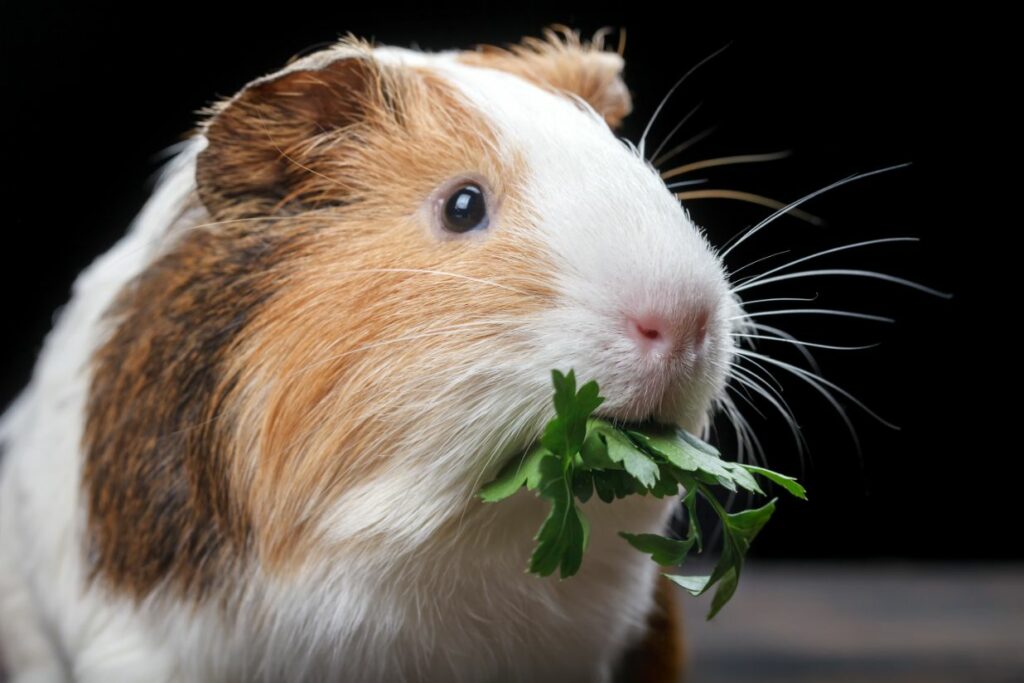Guinea pigs are adorable and affectionate animals, and they require a balanced diet to stay healthy and happy. While hay and vegetables are the staples of their diet, herbs can also be a valuable addition.
Herbs are not only tasty, but they also offer many health benefits. In this guide, we will explore the types of herbs that guinea pigs can eat and how to incorporate them into their diet.

Can Guinea Pigs Eat Herbs?
Herbs are a great source of vitamins, minerals, and antioxidants. They can help improve digestion, boost the immune system, and promote overall health. Guinea pigs love to munch on fresh herbs, and incorporating them into their diet can make mealtime more interesting and enjoyable.
Herbs that Guinea Pigs can Eat
Before feeding your guinea pig any herbs, it is important to know which ones are safe for them. Here is a list of safe herbs that guinea pigs can eat:
- Basil
- Cilantro
- Dill
- Mint
- Parsley
Leafy Herbs
Leafy herbs are a great addition to a guinea pig’s diet. They are low in calories, high in fiber, and contain essential vitamins and minerals. Here are some types of leafy herbs that guinea pigs can eat:
- Basil: Basil is a great source of vitamin K, which helps with blood clotting. It also contains vitamin C, which is important for the immune system.
- Cilantro: Cilantro is rich in antioxidants and contains vitamin A, which is important for vision and skin health.
- Dill: Dill is a good source of calcium, which is important for bone health. It also contains vitamin C and iron.
- Mint: Mint is rich in antioxidants and has a calming effect on the digestive system.
- Parsley: Parsley is a great source of vitamin C and iron. It also has anti-inflammatory properties.
When feeding leafy herbs to guinea pigs, it is important to wash them thoroughly and remove any wilted or damaged leaves. You can offer them as a treat or mix them in with their hay or vegetables.
Root Herbs
Root herbs are also safe for guinea pigs to eat. They are rich in fiber and contain essential vitamins and minerals. Here are some types of root herbs that guinea pigs can eat:
- Carrots: Carrots are a great source of vitamin A, which is important for vision and skin health. They also contain vitamin C and fiber.
- Sweet potatoes: Sweet potatoes are rich in antioxidants and contain vitamin A, vitamin C, and potassium.
- Turnips: Turnips are a good source of vitamin C, fiber, and potassium.
When feeding root herbs to guinea pigs, it is important to cut them into small pieces and offer them in moderation. Too much can cause digestive upset.
Blossoming and Flowering Herbs
Blossoming and flowering herbs are a tasty treat for guinea pigs. They are rich in antioxidants and contain essential vitamins and minerals. Here are some types of blossoming and flowering herbs that guinea pigs can eat:
- Chamomile: Chamomile has a calming effect on the digestive system and can help relieve gas and bloating.
- Lavender: Lavender has a calming effect and can help reduce stress and anxiety.
- Rose petals: Rose petals are rich in antioxidants and contain vitamin C.
When feeding blossoming and flowering herbs to guinea pigs, it is important to offer them in moderation. Too much can cause digestive upset.
Herbs to Avoid
While many herbs are safe for guinea pigs to eat, some can be harmful. Here is a list of herbs that are NOT safe for guinea pigs:
- Aloe vera
- Comfrey
- Foxglove
- Hemlock
- Ivy
- Nightshade
- Poison ivy/oak/sumac
- Rhubarb
- Tomato leaves
Feeding these herbs to guinea pigs can cause digestive upset, liver damage, or even death. It is important to keep them away from your guinea pig’s reach.
How to Incorporate Herbs in Guinea Pig’s Diet
When incorporating herbs into your guinea pig’s diet, it is important to do so in moderation. Here are some tips:
- Offer herbs as a treat or mix them in with their hay or vegetables.
- Start with a small amount and gradually increase it over time.
- Monitor your guinea pig’s behavior and bowel movements to make sure they are digesting the herbs properly.
- Do not replace hay or vegetables with herbs. They should only be a supplement to their diet.
- Offer a variety of herbs to keep mealtime interesting.
Conclusion
Incorporating herbs into your guinea pig’s diet can be a great way to provide them with a variety of essential vitamins and minerals. However, it is important to know which herbs are safe and how to feed them in moderation. By following these tips, you can keep your guinea pig healthy and happy.
- How Long Do American Eskimo Dogs Live? Important Factors and Care Tips - September 29, 2023
- Do American Bulldogs Need Grooming? Essential Tips and Care Guidelines - September 29, 2023
- Do Bengal Cats Enjoy Playing? Essential Tips for Keeping Them Active - September 29, 2023